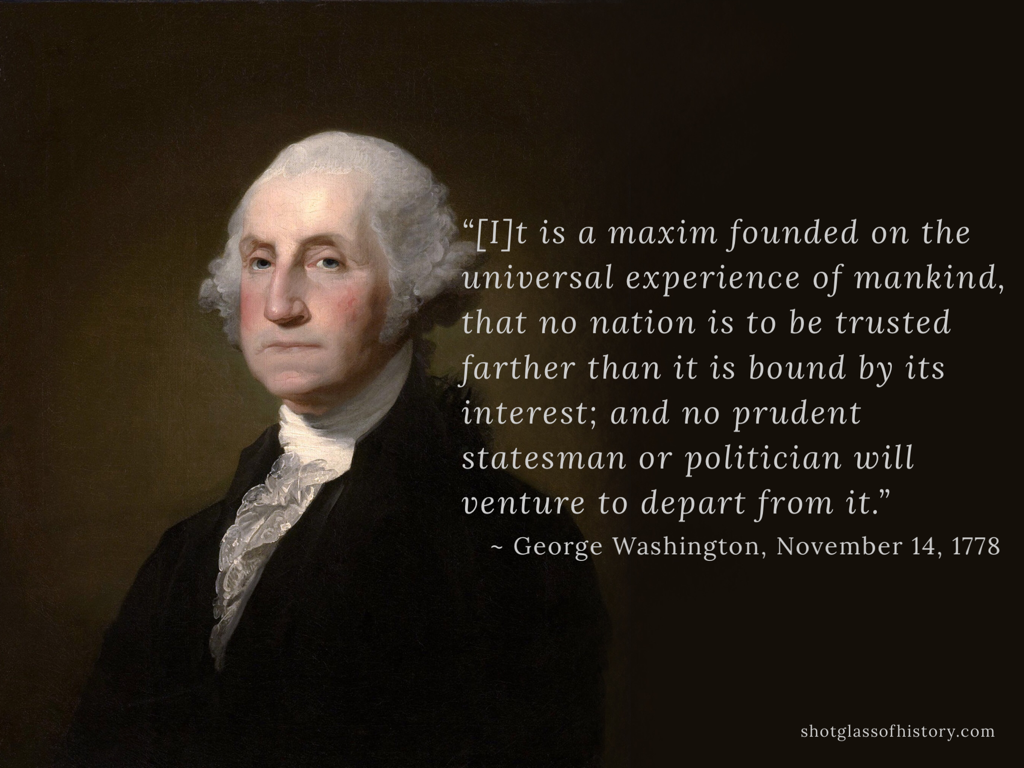Letter from Washington to Henry Laurens, President of the Continental Congress, concerning a proposed joint Franco-American attack on British-Canada.
Washington to Henry Laurens, (November 14, 1778)
Dear Sir: This will be accompanied by an official letter on the subject of the proposed expedition against Canada. You will perceive I have only considered it in a military light; indeed I was not authorised to consider it in any other; and I am not without apprehensions, that I may be thought, in what I have done, to have exceeded the limits intended by Congress. But my solicitude for the public welfare which I think deeply interested in this affair, will I hope justify me in the eyes of all those who view things through that just medium.
I do not know, Sir, what may be your sentiments in the present case; but whatever they are I am sure I can confide in your honor and friendship, and shall not hesitate to unbosom myself to you on a point of the most delicate and important Nature.
The question of the Canadian expedition in the form it now stands appears to me one of the most interesting that has hitherto agitated our National deliberations. I have one objection to it, untouched in my public letter, which is in my estimation, insurmountable, and alarms all my feelings for the true and permanent interests of my country. This is the introduction of a large body of French troops into Canada, and putting them in possession of the capital of that Province, attached to them by all the ties of blood, habits, manners, religion and former connexion of government. I fear this would be too great a temptation, to be resisted by any power actuated by the common maxims of national policy. Let us realize for a moment the striking advantages France would derive from the possession of Canada; the acquisition of an extensive territory abounding in supplies for the use of her Islands; the opening a vast source of the most beneficial commerce with the Indian nations, which she might then monopolize; the having ports of her own on this continent independent on the precarious good will of an ally; the engrossing the whole trade of New found land whenever she pleased, the finest nursery of seamen in the world; the security afforded to her Islands; and finally, the facility of awing and controuling these states, the natural and most formidable rival of every maritime power in Europe. Canada would be a solid acquisition to France on all these accounts and because of the numerous inhabitants, subjects to her by inclination, who would aid in preserving it under her power against the attempt of every other.
France acknowledged for some time past the most powerful monachy in Europe by land, able now to dispute the empire of the sea with Great Britain, and if joined with Spain, I may say certainly superior, possessed of New Orleans, on our Right, Canada on our left and seconded by the numerous tribes of Indians on our Rear from one extremity to the other, a people, so generally friendly to her and whom she knows so well how to conciliate; would, it is much to be apprehended have it in her power to give law to these states.
Let us suppose, that when the five thousand french troops (and under the idea of that number twice as many might be introduced,) were entered the city of Quebec; they should declare an intention to hold Canada, as a pledge and surety for the debts due to France from the United States, [or, under other specious pretences hold the place till they can find a bone for contention], and [in the meanwhile] should excite the Canadians to engage in supporting [their pretences and claims]; what should we be able to say with only four or five thousand men to carry on the dispute? It may be supposed that France would not choose to renounce our friendship by a step of this kind as the consequence would probably be a reunion with England on some terms or other; and the loss of what she had acquired, in so violent and unjustifiable a manner, with all the advantages of an Alliance with us. This in my opinion is too slender a security against the measure to be relied on. The truth of the position will intirely depend on naval events. If France and Spain should unite and obtain a decided superiority by Sea, a reunion with England would avail very little and might be set at defiance. France, with a numerous army at command might throw in what number of land forces she thought proper to support her pretensions; and England without men, without money, and inferior on her favourite element could give no effectual aid to oppose them. Resentment, reproaches, and submission seem to be all that would be left us. Men are very apt to run into extremes; hatred to England may carry some into an excess of Confidence in France; especially when motives of gratitude are thrown into the scale. Men of this description would be unwilling to suppose France capable of acting so ungenerous a part. I am heartily disposed to entertain the most favourable sentiments of our new ally and to cherish them in others to a reasonable degree; but it is a maxim founded on the universal experience of mankind, that no nation is to be trusted farther than it is bound by its interest; and no prudent statesman or politician will venture to depart from it. In our circumstances we ought to be particularly cautious; for we have not yet attained sufficient vigor and maturity to recover from the shock of any false step into which we may unwarily fall.
If France should even engage in the scheme, in the first instance with the purest intentions, there is the greatest danger that, in the progress of the business, invited to it by circumstances and, perhaps, urged on by the solicitations and wishes of the Canadians, she would alter her views.
As the Marquis [Lafayette] clothed his proposition when he spoke of it to me, it would seem to originate wholly with himself; but it is far from impossible that it had its birth in the Cabinet of France and was put into this artful dress, to give it the readier currency. I fancy that I read in the countenances of some people on this occasion, more than the disinterested zeal of allies. I hope I am mistaken and that my fears of mischief make me refine too much, and awaken jealousies that have no sufficient foundation.
But upon the whole, Sir, to wave every other consideration; I do not like to add to the number of our national obligations. I would wish as much as possible to avoid giving a foreign power new claims of merit for services performed, to the United States, and would ask no assistance that is not indispensible. I am, etc.
Source: Transcription available at Founders Online

